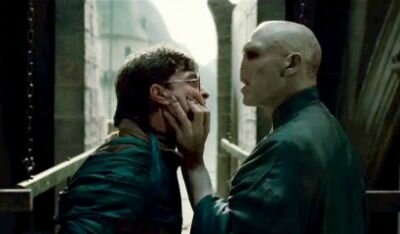|
|
| Tookey's Review |
|
| Pro Reviews |
|
| Mixed Reviews |
|
| Anti Reviews |
|
| Cast |
|
| |
 |
| |
| Released: |
2011 |
| |
|
| Genre: |
ADVENTURE
FANTASY
SERIES
SEQUEL
FAMILY
|
| |
|
| Origin: |
UK/ US |
| |
|
| Colour: |
C |
| |
|
| Length: |
130 |
|
| |
|
| |
|
|
| |
|
|
A satisfying climax.
|
Reviewed by Chris Tookey
|
And so the most commercially successful franchise in cinema history comes to an end, not with a whimper but plenty of spectacular action, and the odd tear in the eye of the audience. The eighth and final episode of the Harry Potter saga is certainly no anti-climax.
Though made in Britain and a credit to our home-grown talent behind and in front of the camera, there’s a wealth of evidence that this has been financed by a major Hollywood studio.
The special effects are more lavish than ever, and the big set-pieces – notably a dragon flight away from Gringotts bank across a London sky, and the final, climactic showdown at a Hogwarts turned into a gigantic battle-ground – are on a splendidly epic scale.
The film begins where the last one ended, with the morally and nasally challenged Lord Voldemort (Ralph Fiennes) triumphantly wielding the world's most powerful wand, having stolen it from the tomb of Harry's former headmaster, Albus Dumbledore (Michael Gambon, who doesn’t let a little thing like death stop him from making an effective last appearance).
After a rather too slow, lugubrious start, the film accelerates, and the introspective gloom of part one turns into genuinely thrilling action, as Harry, Hermione and Ron try to overthrow Voldemort’s dark forces.
Despite being in 3D, the picture looks and sounds better than ever. That’s because Eduardo Serra’s cinematography, Stuart Craig’s production design and Alexandre Desplat’s score (skilfully incorporating motifs from John Williams’ original) are all outstanding.
Emotionally, too, the film packs a punch. The final revelation about Snape’s true loyalties, Harry’s meeting with the ghosts of his parents and the touching epilogue on that now legendary station platform, will all have sensitive souls reaching for their handkerchieves.
On the action front, there are satisfying heroic opportunities for Maggie Smith as Minerva McGonagall, Julie Walters as Mrs Weasley and Matthew David Lewis as a surprisingly courageous Neville Longbottom.
There are even welcome flashes of comedy. The highlight here is Helena Bonham Carter’s performance early on as Hermione, trapped inside Bellatrix Lestrange’s weird body but far too ladylike to convince inside it.
The three young leads fare less well, and the lovey-dovey moments feel perfunctory and apologetic. There’s precious little sexual or romantic chemistry here.
An even more glaring defect is one that has dogged the series since episode five, Harry Potter and the Order of the Phoenix: to be fully understood, the film relies far too much upon the audience having read the books.
There are so many characters that several of them pop up without sufficient explanation. It is far from obvious, for example, why the Weasley parents happen to be at Hogwarts for the showdown. Nor are the loyalties of the Malfoy family ever as clear in the film as they are in the book.
The mechanics of Harry’s Christlike ability to cheat death are similarly opaque.
From the fifth film onwards, the story-telling has felt rushed, and in episode eight there are again too many lurching leaps in the narrative. Screenwriter Steve Kloves is not entirely to blame. The last three of Joanne Rowling’s novels were much too long, poorly edited (if, indeed, they were edited at all) and slackly structured.
That made the task of condensing them to a watchable length in the cinema a well-nigh impossible assignment.
David Yates has been very efficient at directing the last four films, but he lacks the visionary talents of a Peter Jackson, Guillermo del Toro, or indeed Alfonso Cuaron, who did such a stunning job visually on Harry Potter and the Prisoner of Azkaban - ironically, the least commercially successful of the eight.
My biggest reservation about the series is that it became less fun, the more seriously it took itself. As the films have – like Rowling’s books - grown more and more preoccupied with mortality, they have become less entertaining.
Whatever religious and political implications have been read into the books and films, Harry’s principal purpose was to entertain, and Rowling’s greatest gift strikes me as being not her spiritual depth or her skill at plotting, but her sense of humour.
The later pictures have, like the novels on which they are based, lacked the rich comic wit of the first three, and the emphasis on pain, torture and death has made them too frightening for small children. At the same time, the saga has never matured sufficiently to attain the mythic grandeur of Tolkien’s Lord of the Rings, nor come close to his subtlety of characterisation.
So I don’t imagine this will emulate The Return of the King and sweep the Oscars. Nor is the film strong enough to win a lot of new admirers for the franchise.
But I would certainly recommend episode eight to the millions of Harry Potter fans who have grown up alongside the novels and films.
Some of the other blockbusters this summer have been as spectacular, but only this one will have audiences brushing away a tear by the end. It’s a rare film that manages to be both spectacular and sweet.
|
|
|
